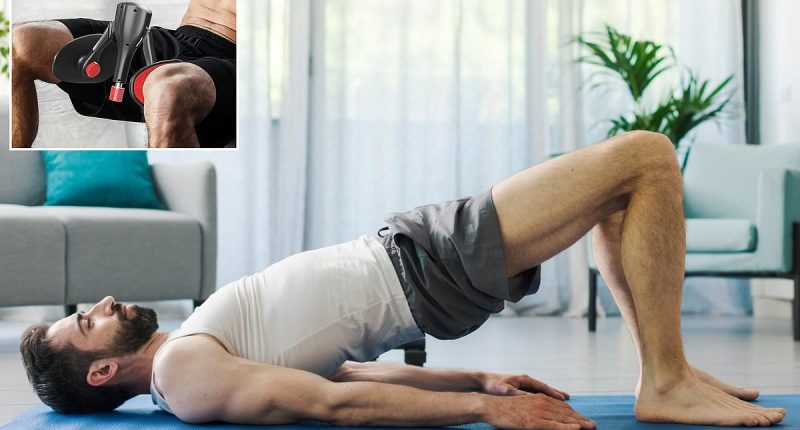Share this @internewscast.com
Middle-aged men are being bombarded with social media ads for bizarre-looking exercise machines that makers claim can solve everything from poor bedroom performance to frequent urination.
The pop-ups on Facebook and Instagram suggest these ‘kegel trainer’ devices – which are held between the thighs and squeezed to strengthen the muscles in the pelvis – will make users ‘a monster in bed’, ‘boost testosterone’ and ‘halt embarrassing leaks’.
But doctors speaking to The Mail on Sunday insist, while pelvic-floor exercises are mostly beneficial for men, there is no need to spend cash on gadgets – even if they only cost £13.
They also warn that ‘overdoing’ these routines could do more harm than good, as they will exacerbate the issues they aim to treat.
Pelvic-floor exercises are usually recommended to women after giving birth to improve recovery – and to those of both sexes with continence issues.
The exercises, known as kegels, involve consciously contracting and relaxing the ‘hammock’ of muscles and ligaments that support the bladder, bowel and rectum, and contribute to sexual function.

Pop-ups on social media suggest that ‘kegel trainer’ devices – which are held between the thighs and squeezed to strengthen the muscles in the pelvis – will make users ‘a monster in bed’, ‘boost testosterone’ and ‘halt embarrassing leaks’
Despite this, many men are unaware of the benefits. ‘Men need to know that they have a pelvic floor,’ says Dr Ashwin Sridhar, a consultant urologist at University College London Hospital.
‘All men over the age of 50 can benefit from these exercises as a preventative measure, otherwise they increase their risk of suffering from poor bladder control and sexual performance issues.’
Dr Sridhar warns that pelvic-floor strength deteriorates with age but also lifestyle factors – such as cardiovascular fitness, weight and underlying health conditions – can have an impact.
‘If men feel that they are having to urinate more often or it becomes more urgent, that is a tell-tale sign you have a weakened pelvic floor,’ adds Dr Sridhar. He suggests that men over 50 should be carrying out training daily.

Urologist Dr Ashwin Sridhar says all men over the age of 50 can benefit from pelvic floor exercises as a preventative measure, otherwise they increase their risk of suffering from poor bladder control and sexual performance issues
Physiotherapist James Pollen, who specialises in the pelvic floor, says: ‘By doing kegel exercises, men are less likely to suffer from premature ejaculation and urinary incontinence as they get older. People often, wrongly, believe that pelvic-floor exercises are just for women, but they can have such a great impact on men.’
An easy way to engage the pelvic floor is to imagine you are trying to stop the flow of urine while also preventing yourself from passing wind. Exercise examples include lying on your back, contracting these muscles for a slow count of five and releasing them for the same period. Mr Pollen suggests that men should be able to carry out eight to ten strong contractions and hold for ten seconds.
‘Men over 45 can benefit from regular kegel training as a preventive measure – as well as men who are experiencing symptoms of a weak pelvic floor, like urinary incontinence or sexual dysfunction,’ says Mr Pollen.
‘If you are younger, and without symptoms, you would benefit from making sure these muscles work by doing the exercises, but less frequently – likely just once a week.’
A team from University Hospital Freiburg last year recruited 237 men who were suffering with bladder emptying disorder.
After 12 weeks, the trial found a significant improvement in symptoms and quality of life measures from participants given the pelvic floor exercise, compared to those in the control group.
Other research has shown that it can help men with premature ejaculation – a condition which estimates suggest up to 30 per cent of men suffer from.
One study, published in the journal Therapeutic Advances in Urology in 2014, asked 40 males suffering from premature ejaculation to perform hour-long exercises three times a week for three months. By the end of the tests, 83 per cent were able to control their ejaculatory reflex for two minutes and 40 seconds – as opposed to the initial average of 39 seconds.

Experts recommend that all men over 50 should be doing pelvic floor exercises, and no equipment is needed
But there is a risk of men ‘overdoing’ pelvic-floor exercises.
‘Overworking these muscles can lead to uncomfortable pelvis pain,’ says Gerard Greene, a physiotherapist. ‘And in younger men, who already have a strong pelvic floor, doing too many of these exercises may even cause erectile dysfunction if they strain the muscle.’
There are pelvic-floor strengthening devices designed for women – some of which cost upward of £100. Many of these are inserted into the vagina and provide real-time feedback on the strength of pelvic floor contractions.
But a 2019 review, published in the journal Neurourology and Urodynamics, evaluated 11 of these gadgets and concluded ‘there was a lack of convincing evidence for most devices’.
As for kegel trainers aimed at men, no evidence could be found to back the claims made by firms selling them. Mr Pollen said: ‘There is no quick fix – no gadget is going to solve your problems. Don’t waste your money.’
Experts advise using the NHS Squeezy app and seeing your GP if you suffer from erectile dysfunction or urinary incontinence.
How to do pelvic floor exercises without a machine
Experts now recommend that all men over 50 should be doing pelvic floor exercises, and no equipment is needed.
First, identify the right muscles: imagine stopping the flow of urine midstream – those are your pelvic floor muscles.
You may feel the base of your penis lift slightly. If you can’t feel these muscles, speak to your GP.

Main exercise routine
- Tighten and lift the pelvic floor muscles
- Hold for five seconds, then release slowly
- Rest a few seconds, then repeat
- Do this for up to eight to ten times. If five seconds feels easy, aim for ten.
Quick contractions
- Do five to ten short, strong squeezes, pulling up and letting go immediately.
Key guidelines
- Aim to perform the routine three times a day
- Don’t exceed ten repetitions per session. unless advised by a medical professional
- Stop if you begin to feel pain















